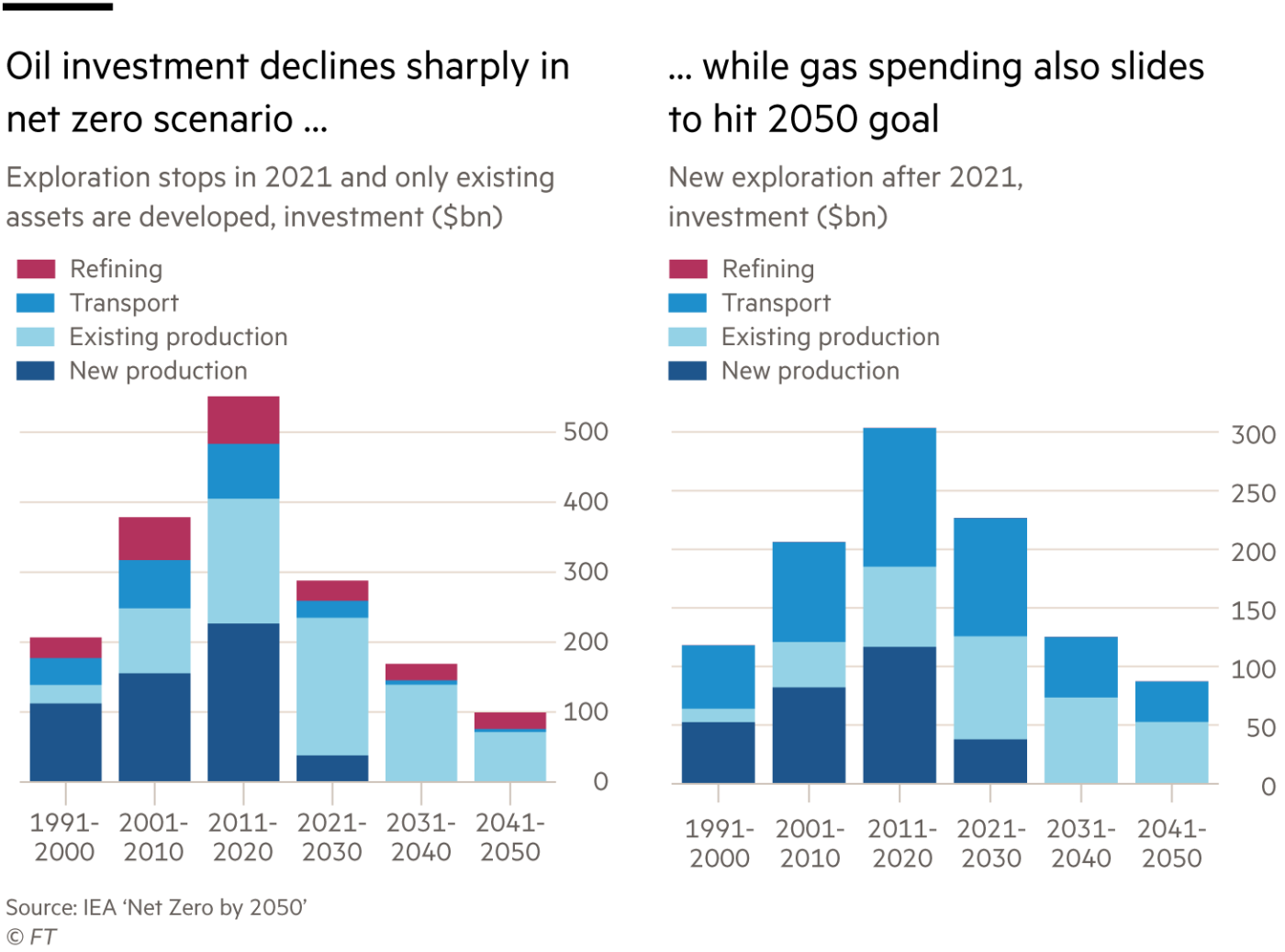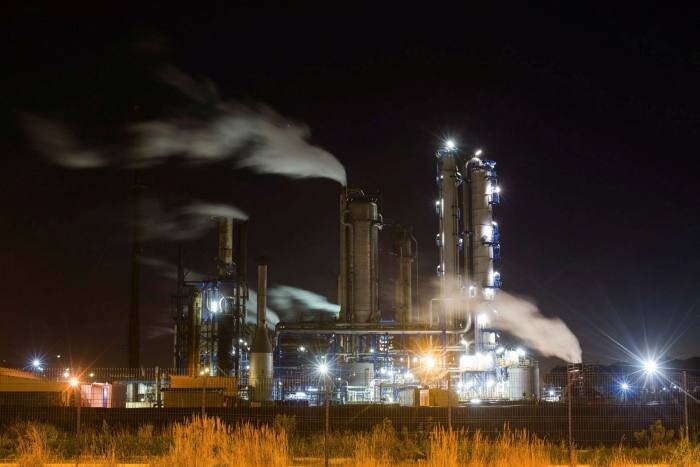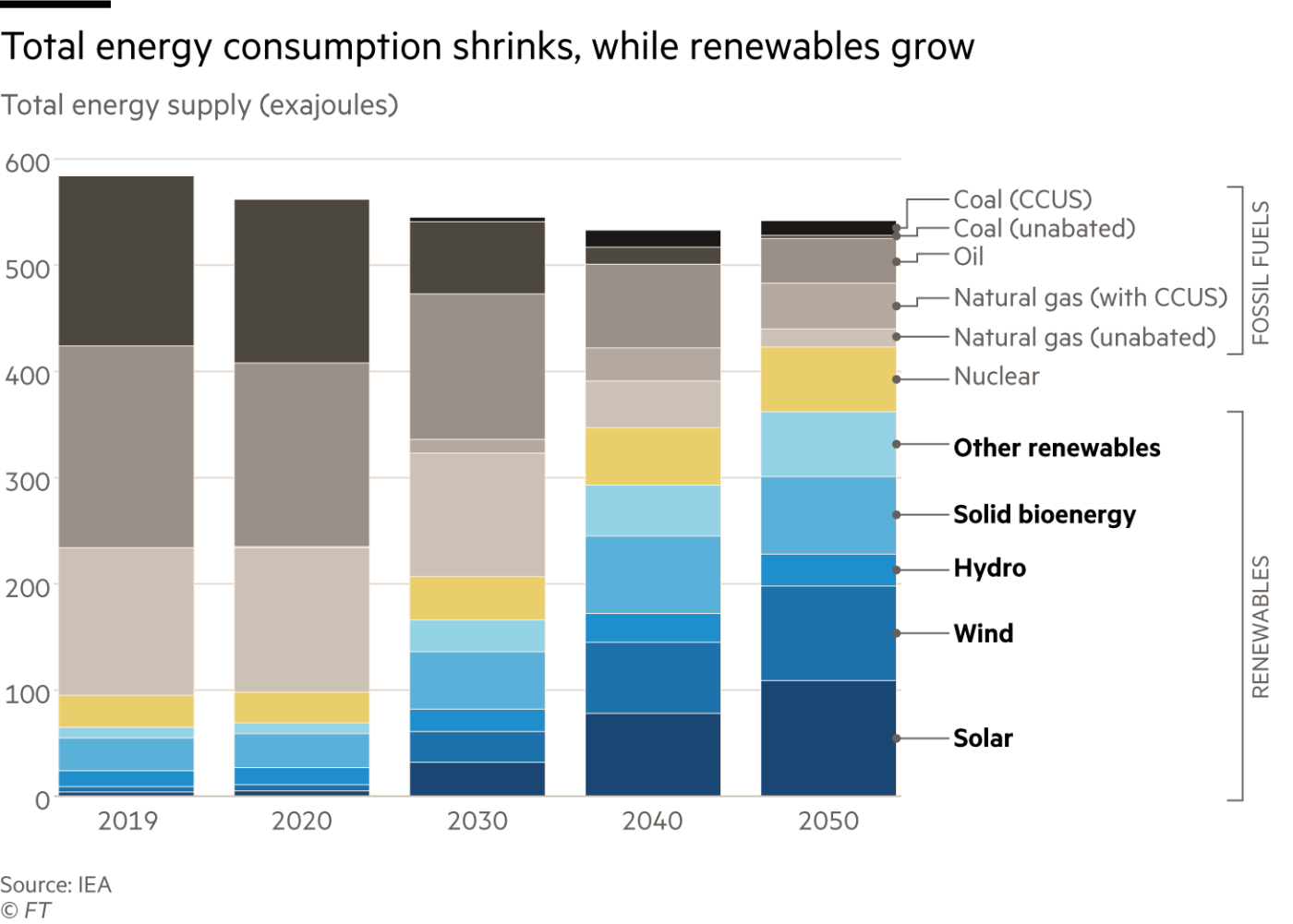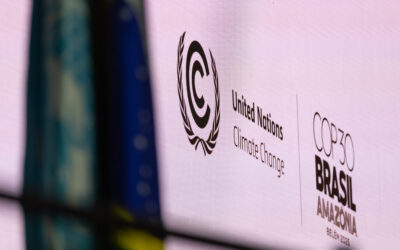By Leslie Hook and Anjli Raval
Energy groups must stop all new oil and gas exploration projects from this year if global warming is to be kept in check, the International Energy Agency said.
The proposal is part of a scenario outlined in a report on ways to achieve net zero carbon dioxide emissions by 2050, a prerequisite to meet the Paris climate accord goal of limiting global warming to 1.5C above pre-industrial levels.
Aside from drastically cutting fossil fuel consumption, an unprecedented jump in spending on low carbon technologies would also be required — around $5tn in energy investments per year by 2030, up from around $2tn today, the report said.
“We need a historical surge in investment,” said Fatih Birol, head of Paris-based IEA on Tuesday, adding that this would add 0.4 per cent annually to GDP growth. “The bulk of it needs to be in clean energy.”
The IEA’s Net Zero report comes as the institution founded in 1974 as the oil watchdog for Western countries has faced pressure from climate activists to produce a road map to the target.
It details an overhaul of energy supply and demand whereby coal demand would plunge by 90 per cent, gas demand would halve and oil demand would shrink nearly 75 per cent by 2050.
Dave Jones, analyst at the climate think-tank Ember, said the report’s call to halt new oil and gas exploration was extremely surprising given the agency’s history.
“I don’t think anyone expected this from the IEA. It is a huge turnround on their part,” he said. “It has been very pro-fossil, so to come out with something like this is just amazing . . . This is truly a knife in the fossil fuel industry.”
The majority of the global economy is subject to some form of net zero emissions target, which means eliminating virtually all carbon dioxide emissions and compensating for the rest through carbon removal programmes.

While the report is not a forecast or a recommendation, the IEA’s scenarios are considered definitive by many governments and often form the basis for energy policy.
As more governments, including the UK, EU and China, pledge to cut emissions to net zero, the IEA report spells out how challenging it will be to get there. “It is a pathway which is narrow,” said Birol. “But still achievable.”
Many big oil companies and producing countries, such as those within Opec, have long argued that investment in new fossil fuel projects had to continue to meet the needs of emerging economies in Asia and Africa.
However, the IEA’s modelled reduction in fossil fuel consumption is far more severe than most producers have prepared for. The share of fossil fuels in the global energy supply would need to fall from around four-fifths currently to one-fifth by 2050. Solar would become the single biggest energy source — or 20 per cent of global energy demand.

“Those countries whose economies are relying on oil and gas revenues will face huge challenges,” said Birol. “We came up with over 400 milestones, and one of them is — there is no need for new oil, gas and coal development, which includes no need for oil and gas exploration investments.”
Royal Dutch Shell’s chief executive Ben van Beurden, speaking at the company’s annual shareholder meeting on Tuesday, said there should be a focus on consumption and not production to reduce emissions.
Though Shell has already ruled out exploring and drilling for oil in new areas after 2025, van Beurden said that “another company can come in and develop these resources.” He added that the company would continue to drill in established areas, such as the Gulf of Mexico, to meet demand.
The IEA acknowledged that “continued investment in existing sources of oil production are needed”. And, even while oil demand declines, the share of oil production controlled by Opec will increase, from around 37 per cent to around 52 per cent in 2050, according to the report.
It envisions carbon-free electricity globally by 2040, along with a surge in research funding over the next decade for new technologies such as batteries and hydrogen electrolysers.

Joeri Rogelj, lecturer in climate change at Imperial College, called the IEA’s net zero scenario hugely significant.
Improvements in energy efficiency mean that global energy demand in 2050 will be around 8 per cent smaller than it is today, even though the world economy will be twice as big. Electricity use will grow, accounting for around half of total energy consumption by 2050.
“The IEA is used as a de facto benchmark for a lot of the planning, both by governments and industry,” said Rogelj, who had called on the IEA to develop a net zero scenario.
Previous IEA scenarios had been heavily criticised for failing to include enough renewables, and underestimating the rate at which solar and wind power world grow.
“If you look back over the past decade, the IEA scenarios have always been lagging a bit,” said Rogelj. “The IEA is simply a slow, grey, rusty, dusty machine, and it just takes a while . . . but I am really happy to see the IEA has now arrived at a net zero pathway.”
Source: Financial Times




0 Comments